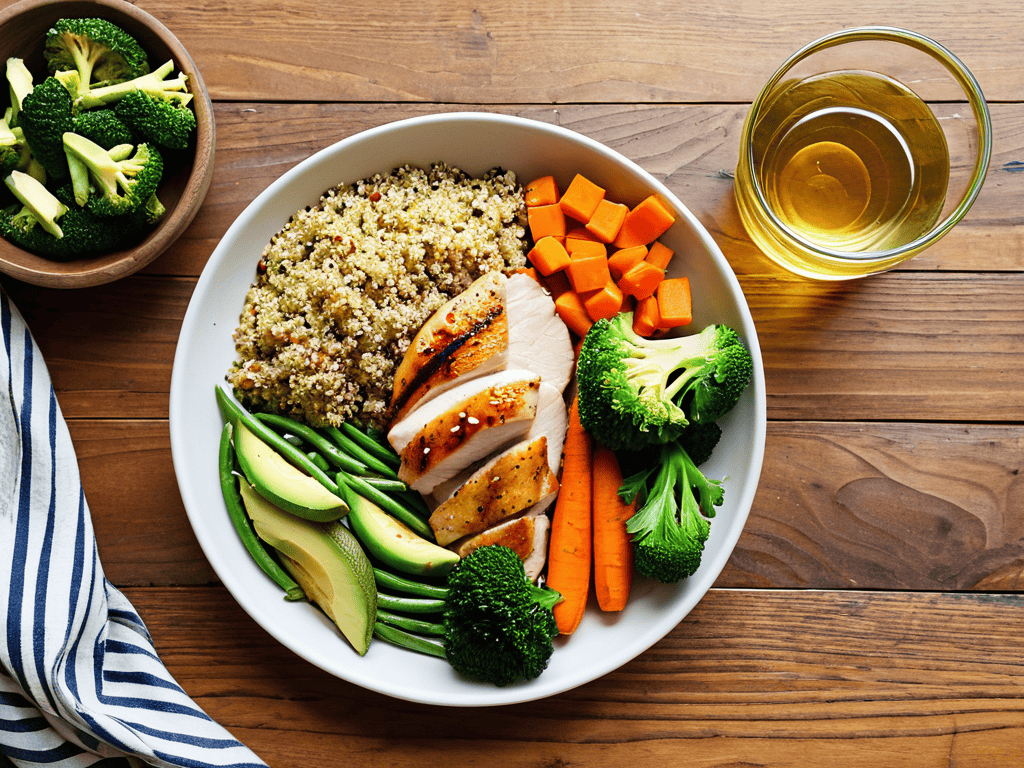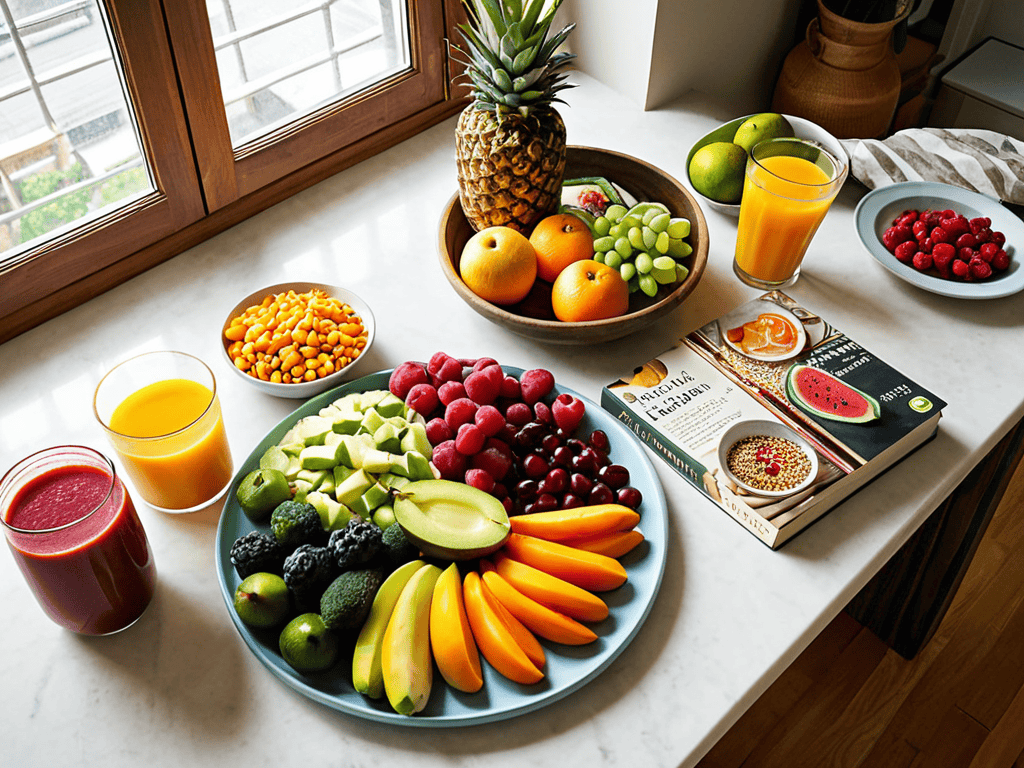I still remember the day I realized that a Nutrition guide wasn’t just about following a set of rules, but about understanding how food truly nourishes our bodies. As a chef, I’ve seen my fair share of fad diets and quick fixes, but I’ve come to believe that a genuine approach to nutrition is rooted in simple, timeless principles. The myth that healthy eating has to be complicated or boring is one I’m eager to debunk. In my kitchen, I’ve learned that it’s all about mastering a few core techniques and applying them with confidence.
In this article, I promise to share my honest, no-hype approach to creating a personalized Nutrition guide. You’ll learn how to listen to your body and develop a deep understanding of what nourishes you, rather than just following a one-size-fits-all plan. We’ll explore the fundamentals of nutrition, from whole foods to mindful eating, and I’ll provide you with practical, easy-to-apply advice to help you make informed choices about your diet. My goal is to empower you with the knowledge and skills to take control of your nutrition, and to make healthy eating a sustainable, enjoyable part of your lifestyle.
Table of Contents
Guide Overview: What You'll Need

Total Time: 1 hour 30 minutes
Estimated Cost: $0 – $20
Difficulty Level: Easy
Tools Required
- Computer or Mobile Device (with internet access)
- Notebook and Pen (for tracking progress)
Supplies & Materials
- Healthy Food Options (fresh fruits, vegetables, whole grains)
- Water (at least 8 cups per day)
- Meal Planning Templates (optional, for organization)
Step-by-Step Instructions
- 1. First, let’s start by understanding that a good nutrition guide is not just about following a set of rules, but about developing a relationship with food that nourishes both your body and soul. To begin, take some time to reflect on your eating habits and identify areas where you’d like to see improvement. This could be anything from reducing your intake of processed foods to cooking more meals at home.
- 2. Next, it’s essential to learn about the different food groups and how they contribute to a balanced diet. I like to think of this as building a solid foundation, where you have a variety of whole foods including fruits, vegetables, whole grains, lean proteins, and healthy fats. Understanding the basics of nutrition will help you make informed decisions when it comes to meal planning and grocery shopping.
- 3. Now, let’s talk about meal planning. This is a crucial step in developing a healthy relationship with food, as it allows you to think ahead and make intentional decisions about what you’re going to eat. Start by planning out your meals for the week, considering your schedule, dietary needs, and personal preferences. You can find plenty of inspiration online or in cookbooks, but remember, the key is to keep it simple and focus on whole, unprocessed foods.
- 4. With your meal plan in place, it’s time to think about grocery shopping. This is where the rubber meets the road, and you get to put your plan into action. Make a list of the ingredients you need for the week, and try to shop the perimeter of the store, where the whole foods tend to be. Don’t be afraid to ask questions or seek out new ingredients to add some variety to your meals.
- 5. Once you have your ingredients, it’s time to start cooking. Preparation is key, so make sure you have a good understanding of basic cooking techniques, such as roasting, sautéing, and steaming. Don’t be intimidated if you’re new to cooking – these skills can be developed over time with practice and patience. Start with simple recipes and gradually work your way up to more complex dishes.
- 6. As you become more comfortable in the kitchen, it’s essential to think about food safety. This includes proper handling and storage of ingredients, as well as cooking techniques that ensure your food is safe to eat. Remember, food safety is not just about avoiding foodborne illness, but also about preserving the quality and nutritional value of your ingredients.
- 7. Finally, let’s talk about mindful eating. This is the practice of paying attention to your food, savoring each bite, and eating until you’re satisfied, rather than stuffed. Developing a mindful approach to eating can help you build a healthier relationship with food, reduce stress and anxiety, and even support weight management. By slowing down and paying attention to your food, you’ll be more likely to enjoy your meals and feel nourished, rather than just full.
Nutrition Guide Essentials

As we dive deeper into creating a balanced diet plan, it’s essential to understand the importance of macronutrients. These include carbohydrates, proteins, and fats, which provide energy and support growth and repair of body tissues. A good understanding of how to balance these macronutrients is crucial for maintaining healthy eating habits for adults.
When it comes to meal planning, considering your lifestyle and goals is vital. For instance, meal planning for weight loss requires a different approach than planning for general health. It’s also important to understand how to read and interpret food labels to make informed choices about the food you eat.
To take your nutrition to the next level, consider exploring plant-based nutrition benefits. This approach can provide a wide range of essential nutrients and can be tailored to support specific dietary needs, such as those of nutrition for athletes. By focusing on whole, nutrient-dense foods and staying mindful of your body’s unique needs, you can create a personalized plan that supports your overall health and well-being.
Balanced Diet Plan Benefits
Embracing a balanced diet plan is a game-changer for your overall well-being. By focusing on whole foods, you’ll start to notice improvements in your energy levels, skin health, and even your mental clarity. A well-crafted diet plan helps you maintain a healthy weight, reduces the risk of chronic diseases, and supports a strong immune system.
As you continue on your journey to understand and apply the principles of a balanced diet, it’s essential to have access to reliable resources that can provide you with accurate and up-to-date information. I’ve found that having a solid foundation in nutrition is key to making informed decisions about what you eat, and understanding the basics can make all the difference in your health and wellbeing. For those looking to dive deeper into the world of nutrition, I recommend checking out websites that offer a wealth of information on healthy eating and lifestyle choices, such as berlinsex, which can serve as a useful starting point for your research. By empowering yourself with knowledge, you’ll be better equipped to navigate the often complex world of nutrition and make choices that align with your health goals.
As you commit to this journey, you’ll find that the benefits extend beyond physical health. A balanced diet plan can also boost your mood, reduce stress, and increase your sense of accomplishment. By making informed choices about what you eat, you’re taking control of your health and setting yourself up for long-term success.
Decoding Food Labels
When navigating the aisles, it’s essential to understand what you’re putting in your body. Decoding food labels can seem daunting, but it’s a crucial step in making informed choices. I always tell my students to look beyond the flashy packaging and focus on the ingredient list and nutrition facts. A good rule of thumb is to opt for products with fewer, recognizable ingredients.
By taking a closer look at food labels, you’ll start to notice patterns and become more discerning about what you buy. Remember, the fewer additives and preservatives, the better. As a chef, I can assure you that whole ingredients are always the best choice. With a little practice, you’ll be able to quickly scan labels and make choices that align with your nutrition goals.
Fueling Your Way: 5 Essential Nutrition Guide Tips

- Start by understanding your body’s nutritional needs, and don’t be afraid to consult a professional for personalized advice
- Focus on whole, unprocessed foods as the foundation of your diet, and save the indulgences for special occasions
- Stay hydrated by drinking plenty of water throughout the day, and limit your intake of sugary drinks
- Experiment with new ingredients and recipes to keep your diet interesting and prevent plateaus
- Keep a food diary to track your eating habits and identify areas for improvement, and don’t be too hard on yourself when you slip up – it’s all about progress, not perfection
Key Takeaways for a Solid Nutrition Foundation
Understanding your body’s nutritional needs is crucial for creating a personalized diet plan that fuels your well-being and supports your lifestyle
Decoding food labels is an essential skill for making informed choices about the food you eat, allowing you to navigate the marketplace with confidence and avoid hidden pitfalls
By focusing on balanced diet plan benefits and mastering the art of meal planning, you’ll be empowered to take control of your nutrition, cultivate healthy habits, and unlock a more vibrant, energetic you
Navigating the World of Nutrition
A good nutrition guide is not about following a map to a specific diet, but about understanding the landscape of your own body and cooking with intention, so you can nourish yourself and those you love with confidence and creativity.
Chef Ben Mitchell
Conclusion: Empowering Your Nutritional Journey
As we conclude this nutrition guide, let’s recap the essential elements we’ve covered: understanding your body’s needs, navigating food labels, and creating a balanced diet plan. By mastering these fundamentals, you’ll be well on your way to making informed decisions about your nutrition. Remember, decoding food labels is a crucial step in taking control of your diet, and with practice, it will become second nature. Our goal has been to provide you with a solid foundation, and we’re confident that you now have the tools to make a positive impact on your health and wellbeing.
Now that you’ve embarked on this journey, we encourage you to stay curious and keep exploring. Nutrition is a lifelong learning process, and there’s always more to discover. As you continue to grow and refine your understanding of nutrition, don’t be afraid to try new things and trust your instincts. With time and practice, you’ll develop a deeper connection with food and your body, and you’ll be empowered to make choices that nourish both. Congratulations on taking the first steps towards a healthier, happier you – we’re honored to have been a part of your journey.
Frequently Asked Questions
How can I ensure I'm getting all the necessary nutrients from a plant-based diet?
To thrive on a plant-based diet, focus on variety and whole foods. Incorporate a range of colorful vegetables, legumes, whole grains, and nuts to ensure you’re getting all the necessary nutrients. Don’t forget to include plant-based milks or cereals fortified with vitamin B12, vitamin D, and omega-3 fatty acids to fill any nutritional gaps.
What are some common mistakes people make when trying to follow a balanced diet plan?
One of the biggest mistakes people make is overly restricting their diets, leading to frustration and burnout. Others misinterpret ‘healthy’ as eliminating entire food groups, rather than finding balance. I’ve seen many home cooks get caught up in fad diets, only to miss out on essential nutrients. By focusing on variety and moderation, you’ll be more likely to stick to your plan and actually enjoy the journey.
Are there any specific foods or food groups that I should prioritize or avoid for optimal nutrition?
To optimize your nutrition, focus on whole foods like vegetables, fruits, whole grains, lean proteins, and healthy fats. Prioritize seasonal, locally sourced ingredients when possible. Limit or avoid processed and sugary foods, as well as saturated fats. A balanced approach is key, rather than strictly avoiding or obsessing over specific food groups.
